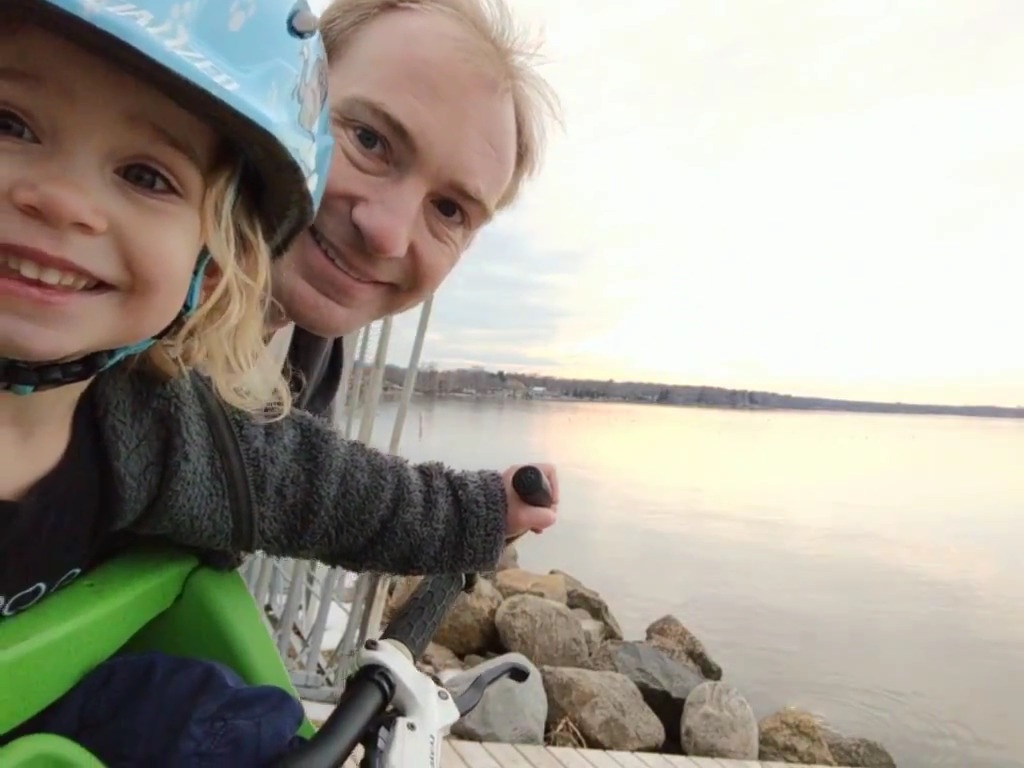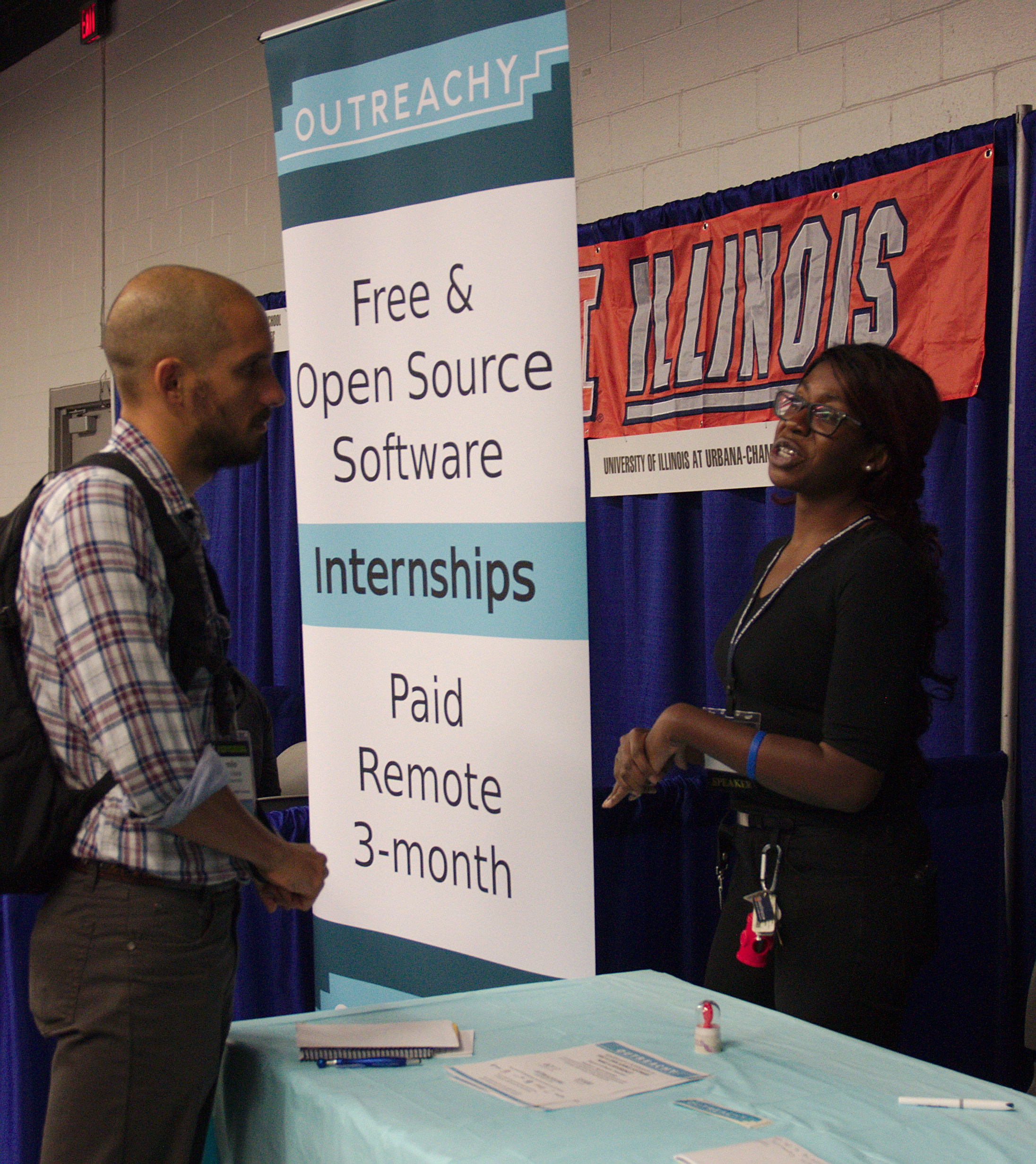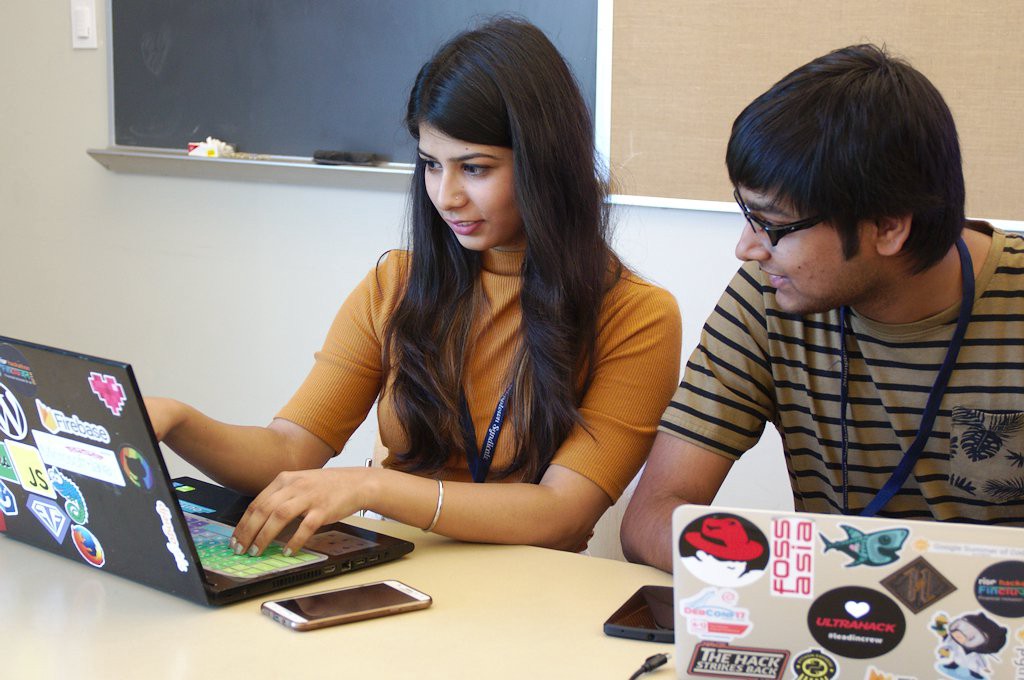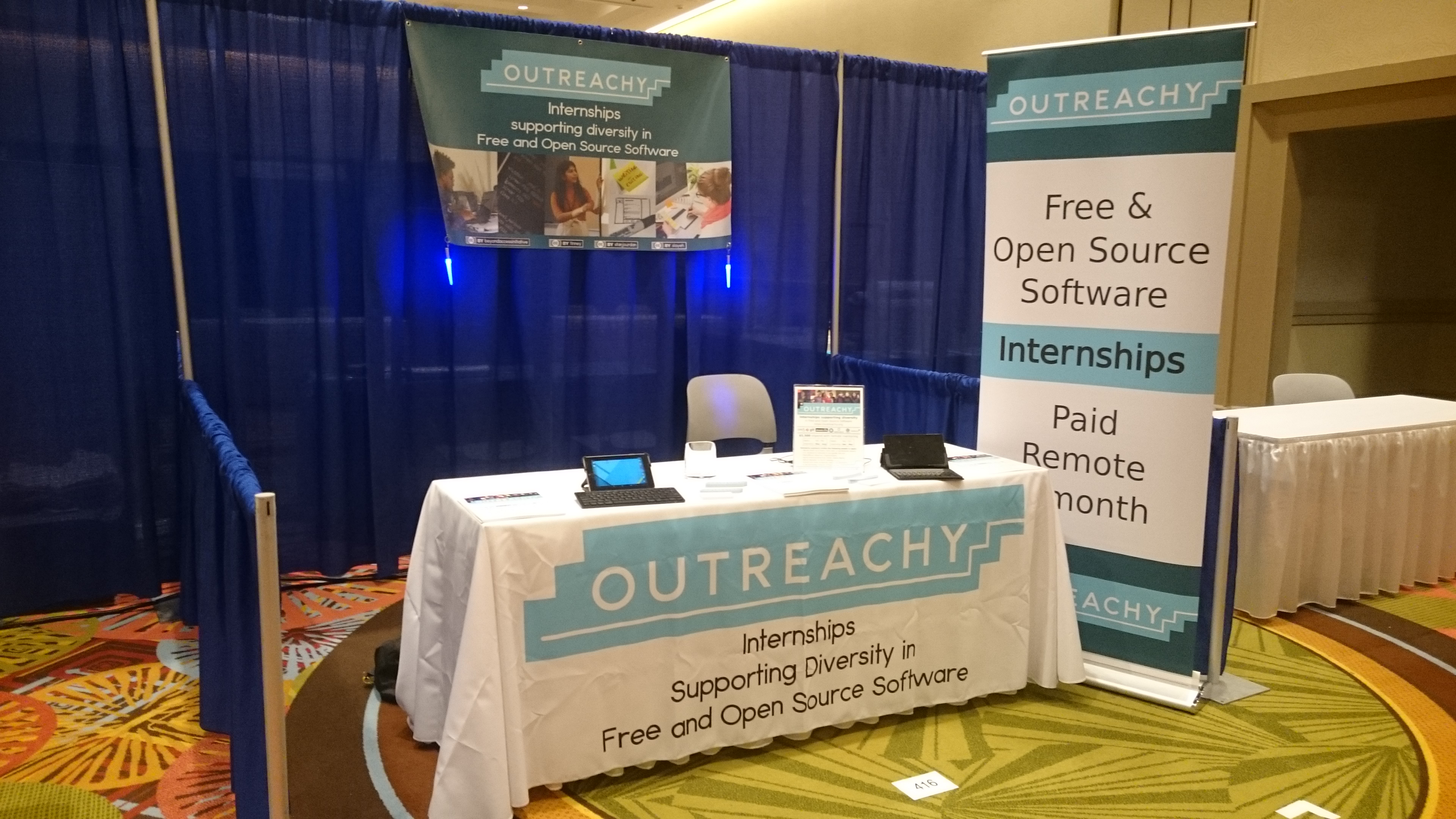![[RSS]](/static/img/feed-icon-14x14.2168a573d0d4.png) Conservancy Blog
Conservancy Blog
Displaying posts
tagged Outreachy
![]()
Conservancy News Round-up
by on May 28, 2019
May is for code releases! Check out these videos, blog posts from member projects, code releases and upcoming events.
Recent Videos and Podcasts
Deb's talk on Free Software/Utopia is up, on the Free software Foundation's MediaGoblin server.
Deb was also the guest of honor on Libre Lounge, Episode 19: Community Development with Deb Nicholson. Thanks to Chris and Serge for their dedication to free software and to Conservancy's work!
On Free as in Freedom, Karen and Bradley discuss two additional permissions that can be used to “backport” the GPLv3 Termination provisions to GPLv2 — the Kernel Enforcement Statement Additional Permission, and the Red Hat Cooperation Commitment.
Our Member Projects Have Been Busy
This summer's Outreachy interns were announced. "Congratulations to the 43 interns accepted to the Outreachy May 2019 to August 2019 round!"
phpMyAdmin -- along with several other Conservancy projects -- are excited about participating in Outreachy this round.
MicroBlocks presented at ROBOLOT, an educational robotics conference held in Catalan. The video of their panel is about 75% Catalan and 25% English, so feel to skip around or brush up on your Catalan.
The Godot team attended GDC, aka the "Game Developers Conference" in San Francisco reported on their improved name recognition at this year's event.
The folks at Reproducible Builds, shared" that security and software supply chain attacks were in the news and that this was a busy month for their distro work.
Some recent code releases:
- Kallithea 0.4.1 released
- Mercurial 5.0 released
- QEMU 4.0 adds micro:bit emulation support
- Samba 4.10.4 available for download
- SWIG-4.0.0 released
- Wine 4.0.1 released
Etherpad merged in a big chunk of code to improve recovery from brief server outages. "The resulting code is 15% smaller than before, and is also much easier to comprehend."
What's coming up?
Catch up with staff:
Karen keynotes sambaXP on June 5th at 10:15 local time in Göttingen, Germany.
Bradley will be at the Ninth Annual RacketCon in Salt Lake City, Utah, where he will give a talk titled, "Conservancy and Racket: What We Can Do Together!"
Many of our projects have events coming up:
In addition to the aforementioned sambaXP and RacketCon...
First talks are announced for Selenium's upcoming London conference, tickets are available now.
North Bay Python has announced their dates for this year's event, November 2 & 3, 2019. Talk submissions will open soon!
Conservancy News Round-up
by on April 17, 2019
Check out these videos, blog posts from member projects, code releases and upcoming events.
Recent Videos
- Bradley and Karen during their keynote at FOSDEM, "Can Anyone Live in Full Software Freedom Today? Confessions of Activists Who Try But Fail to Avoid Proprietary Software"
- Microblocks in use (it's in Catalan, but the smiling faces are understandable in any language!)
- Deb keynoted Gitmerge, "The Future of Free Software"
- Godot engine in use! These are from published games and games in development. Check out the Desktop / Console showreel and the Mobile Showreel.
- Bradley gave a talk at SCaLE, "If Open Source Isn't Sustainable, Maybe Software Freedom Is?" that got written up on LWN.
- The State of Godot address by Juan Linietsy
Our Member Projects Have Been Busy
- Outreachy getting ready for another round of interns! You can see the projects that are participating in this summer's program here.
- Lots of Reproducible Builds work in March
- Godot is receiving a MOSS Grant
- Inkscape's SCALE17x Hackfest 2019 launched plans for 1.0 release and more
- Recent Clojurists Together work funded through Conservancy
Some recent code releases:
What's coming up?
Catch up with staff:
- Deb speaks about governance at Open Source 101 on Thursday
- Swing by Bellingham to say hi to Bradley at our Linuxfest Northwest booth later this month
- Deb speaks about diversity at Red Hat Summit in May
Many of our projects have events coming up:
- Selenium Conf in Tokyo
- Ninth Annual RacketCon, plus Bradley will be there.
- Samba XP -- Karen is keynoting!
- One week blocks workshop for public school teachers, "Physical Computing with the BBC micro:bit"
- Teaching Open Source planning a summer POSSE meeting
Bonus news! GPLv3 code made the famous black hole picture possible. Congrats to Doctor Katie Bouman and her team!
Sage Weil: Challenges and Hope
by on January 9, 2019
This is part of our ongoing series on generous matching donors. Sage is the principal architect of Ceph, a completely distributed free software storage platform. Sage serves on the advisory board for CROSS, a program that turns technology created through student research into successful free and open source projects. He even won the O'Reilly Open Source Award in 2013 for his work. Sage and several other outstanding individuals are joining Private Internet Access and a big anonymous donor in offering a total of $90K in matching funds (just through January 15th!) to Conservancy for our continued work to support community-driven licensing and governance practices.

Deb: What's the most exciting thing you've seen recently in free software?
Sage: There are two key free software trends that give me hope. The first is the recent traction in open hardware, most notably with RISC-V, which moves us closer to being able to build a completely free and open hardware *and* software stack. The second is continued commitments to open source from governments around the world, most recently with the EU's bug bounties on a few critical projects.
Deb: Tell us about the moment you decided to become a Conservancy supporter.
Sage: When I learned about Conservancy's involvement in Christoph Hellwig's GPL suit against VMWare I realized that Conservancy was more concerned with user freedom than industry politics and/or the business interests of its supporters. It's because Conservancy is a grassroots organization, supported by individual donors, that it is able to fight unequivocally for free software principles and software freedom.
Deb: Do you have a favorite Conservancy project and/or one that is indispensable to your own work?
Sage: Conservancy's support for Outreachy and its willingness to tackle the diversity challenges in open source communities is a huge contribution to the free software movement. The lack of diversity in the communities I work most closely with is (in my view) one of the greatest risks to the long-term health and success of the relevant projects.
Deb: What do you hope to see Conservancy accomplish in the next five years?
Sage: I would love to see Outreachy continue to expand its reach and scope, and I look forward to seeing the GPL litigation demonstrate that copyleft licenses can't be willfully violated with impunity. Most importantly, though, I would like to see Conservancy continue to serve as a living example of what true open source advocacy looks like as a challenge and model for other free software organizations.
Deb: Anything else you'd like to add?
Sage: The two technology trends that most concern me are the continued erosion of online privacy (and relatively scarcity of freely available tools to help protect private communications and anonymity online) and the growth of public cloud providers as new instruments of software lock-in. Free software is a key component of any strategy to push back against both of these trends, and I am happy to support organizations like Conservancy that are focused on preserving the user freedoms that we often take for granted.
Do you share Sage's vision of a diverse, vibrant and community-driven free software future? Please donate today! Or if you've already donated, share stories about our work and let folks know that we depend on grassroots support to do all the work that we do. Thanks!
The photo of Sage and his daughter is used here courtesy of Sage Weil.Outreachy's Year in Review: 2018 was a Big Year for Outreachy!
by on December 20, 2018
As in previous years, Outreachy's goal is to increase diversity in free software. Between May 2018 and December 2018 internship rounds, we supported 86 interns from around the world, paying and expecting to pay $473,000 in internship stipends.

The Outreachy interns worked with mentors from 27 free software communities: Bahmni, Ceph, Cloud Native Computing Foundation Tracing, Debian, Discourse, Fedora, Free Software Foundation, Git, GNOME, GNU Guix, Humanitarian OpenStreetMap Team, Jenkins, JupyterHub, Kubernetes, LibreHealth, Linux Kernel, Mozilla, mUzima, Open Bioinformatics Foundation, Open Data Kit, Open Humans, Open Robotics, OpenStack, Public Lab, QEMU, Tor Project, and Wikimedia.
Our non-profit home, Software Freedom Conservancy, makes possible all this work on free software done via Outreachy, as well as work done via Conservancy's nearly fifty other member projects. Now is the time you can support Conservancy by donating to its yearly fundraiser and having your donation matched by generous donors. Please consider becoming a Conservancy Supporter today!
Outreachy WebsiteOutreachy made some big changes in 2018. Outreachy launched a new Outreachy website based on Django, the free software Python-based web framework. The website is licensed GPL v3, with the source code released on GitHub.
Our website allows Outreachy organizers and mentors to review applications, approve communities to participate in the round, review intern selections, and collect intern and mentor agreements. The website also allows mentors to list the projects applicants can work on.
One of the goals of the Outreachy website was to encourage Outreachy mentors to better support people with impostor syndrome. Impostor syndrome is caused by several factors: unrelenting standards for yourself, systemic discrimination sowing doubt in your mind about whether you belong in your field, and discrimination that makes you work twice as hard to get the same level of recognition. Imposter syndrome makes people who are from groups under-represented in tech feel like they aren't good enough, or that all their accomplishments are due to luck.
Outreachy organizers watched applicants struggle with impostor syndrome when they were picking a project. They would often ask, "But do I need to be an expert in Python to apply to this internship?" This is fairly common, as people with impostor syndrome are less likely to apply to a job if they don't meet 100% of the criteria.

The new Outreachy website encouraged mentors to break down project skills in two ways: What impact does this skill have on intern selection, and how experienced does someone have to be in this skill? Mentors now list whether a project skill is required, preferred, or a bonus. Mentors also list what experience level the applicant needs in that skill. That could range from "no experience necessary, we'll teach you" to "this is a challenge and you'll be expanding your skills independently".
Outreachy organizers saw an immediate decrease in the number of questions about project selection sent to the mentors mailing list after the new website was put into place. The only questions about project selections were whether we would add any more projects with a particular type of technology or skill. In interviews with Outreachy December 2018 interns at the Mozilla All Hands, they mentioned that finding projects that fit their skills was much easier. Success!
Outreachy At DjangoConOutreachy organizer Sage Sharp presented their work on the Outreachy website at DjangoCon U.S. The video from the talk "Herding Cats with Django: Technical and Social Tools to Incentivize Participation" can be watched on the DjangoConwebsite
Sage also participated in the DjangoCon hackathon. Djangonauts solved several issues with CSS and suggested ways to tackle new projects. It was amazing for Outreachy to get involved with the Django community after being supported by their thorough documentation for so long!
Outreachy at TapiaSage Sharp, along with three former Outreachy interns, also attended the ACM Richard Tapia Celebration of Diversity in Computing conference. Tapia is a conference that allows undergraduate and graduate students in Computer Science to celebrate the diversity that exists in computing and connect with peers, academics, and industry professionals who share their backgrounds, ethnicities, disabilities, and gender identities.
Tapia is the perfect conference to introduce free software and Outreachy to a diverse group of Computer Science students and educators. Outreachy had a booth at the conference again this year. We collected over one hundred signups for our announcement mailing list, and heard about Tapia attendees spreading the word to their university groups about Outreachy. This is Outreachy's third year with a booth at Tapia.
 Diversifying Outreachy
Diversifying Outreachy
Racial diversity among Outreachy applicants has continued to increase, partially thanks to our outreach to communities and events like Tapia. In the December 2017 round there were 61 applicants from the United States, and 34% of those applicants (21 people) were Black/African American, Hispanic/Latin@, Native American/American Indian, Alaska Native, Native Hawaiian, or Pacific Islander. In the December 2018 round, there were 140 applicants from the United States, and 52% of those applicants (73 people) were Black/African American, Hispanic/Latin@, Native American/American Indian, Alaska Native, Native Hawaiian, or Pacific Islander.
It's amazing to see Outreachy's U.S. applicant racial diversity increase from 34% to 52%. Applicants of color from the United States made up for 8.3% of the total approved Outreachy applicants in the December 2017 round, and 11.2% of the total approved Outreachy applicants in the December 2018 round. We don't track racial demographics for applicants outside the United States, so it's unknown how many applicants of color from other countries applied.
Looking at gender diversity, Outreachy tracks the percentage of approved applicants who are women, as well as the percentage of people who are transgender and genderqueer. In the May 2018 round, 89% of applicants were women, 8% of applicants were genderqueer, and 4% were transgender. In the December 2018 round, 83% of applicants were women, 13% of applicants were genderqueer, and 6% of applicants were transgender.
Outreachy Supporting Broader DiversityFor a long time, Outreachy's goal has been to expand to additional groups of people who are underrepresented in free software. In September 2018, Outreachy made changes to the application process to invite anyone who faces under-representation, systemic bias, or discrimination in the technology industry of their country to apply.
Outreachy added initial application essay questions, which make it easy for applicants not familiar with diversity and inclusion concepts to relate key circumstances relevant to them being from a group underrepresented in tech. Essay questions asked whether the applicants' learning environment has few people who share their identity or background, what systematic bias or discrimination applicants have faced while building their skills, and what barriers or concerns kept applicants from contributing to free software. The Outreachy organizers will continue to refine the essay questions with lessons learned from the most recent application round.
Outreachy still expressly invites applications from women (both cis and trans), trans men, and genderqueer people from around the world, as well as residents and nationals of the United States of any gender who are Black/African American, Hispanic/Latin@, Native American/American Indian, Alaska Native, Native Hawaiian, or Pacific Islander.
Outreachy Payment ChangesThis year, Outreachy made a change to our intern payment structure in order to better support people from lower socio-economic backgrounds. Our goal was to ensure that interns got slightly more money up front, in order to make sure that people who were financially relying on the internship stipend would have an easier time supporting themselves. Interns receive the larger payment after two weeks of work, which is enough time for mentors and organizers to determine they have successfully started their internships. Our full announcement on payment changes can be found here.
Outreachy FinancesOutreachy received several big donations this year!
In August, Outreachy [received a $100,000 donation from Handshake. Handshake donated to the Outreachy general fund, which supports program administration and increasing awareness of opportunities in free software among people from underrepresented groups in tech.
In November, Outreachy was received $50,000 in support from Ford Foundation. This supports Outreachy's efforts to improve our program's documentation. We have a lot of plans for this grant, including improving our instructions for our applicants, creating translations of our website and promotional materials, writing more blog posts, and creating videos to support and promote our program.
Outreachy also received over $123,000 in general fund sponsorship from Bloomberg, Google, Microsoft, DigitalOcean, Tidelift, Codethink, Indeed, and the Linux Foundation.
The Outreachy general fund is essential to ensuring Outreachy continues running. The Outreachy general fund pays for administrative tasks, such as the Outreachy organizers keeping 20 coordinators, 60 mentors, and 1,000+ applicants on track during the Outreachy application period. The Outreachy general fund also pays for time and travel costs for promoting the program.
The Outreachy general fund is also used by the participating free software communities when they find more exceptional interns than they have sponsorship for. Free software communities with funding for at least one intern can ask for these funds. Outreachy provides $6,500 per intern from the general fund to approved interns from these communities.
In 2018, the Outreachy general fund was used for budget items like:
- $32,500 on funding 5 interns from the general fund for Jenkins, Free Software Foundation, Humanitarian OpenStreetMap Team, Linux Kernel, and Open Robotics
- $12,948 on conference travel, the Tapia conference sponsorship, and booth promotional items
- 683 hours on developing the Outreachy website (released under GPL v3)
- 453 hours on program organization
- 63 hours on documentation
- 14 hours on graphic design
Outreachy internships (aside from the ones sponsorsed by the general fund) are funded by sponsorship from organizations and companies committed to increasing diversity in tech and free software. The funds from our generous sponsors provided 81 Outreachy interns with $445,500 in internship stipends and $10,696 in travel reimbursements.
Outreachy Applicant HelpersThe combination of these two grants, as well as Outreachy's general fund sponsors allowed Outreachy to hire two additional part-time staff members!
Anna e só is a former Outreachy intern with Wikimedia in the December 2017 to March 2018 round. Anna lives in Goiânia, Goiás, Brazil and uses they/them pronouns. Anna's internship with Wikimedia involved identifying issues that new Wikimedia translators face, and creating guides to help them. Anna is involved in the disability activism community in Brazil.
Bethany Lister has a Masters in Public Affairs, with a concentration in non-profit management. Bethany lives in Portland, Oregon, USA, and uses she/her pronouns. She was a Community Engagement Manager for NTEN, which supports non-profits in using technology to achieve their goals. The Outreachy organizers loved Bethany's experience in building up community and building relationships with NTEN conference attendees, sponsors, and partners.
Anna and Bethany proved to be invaluable in reviewing the essay questions in over 900 initial applications. They have provided fresh perspective on places for improvement in the Outreachy documentation, processes, and website. We look forward to working more closely with Bethany and Anna in 2019!
What's next?Outreachy continues to provide rock solid support for over 80 interns a year. We look forward to improving our internship processes, website, and documentation, and to working closely with our two new part-time staff members.
Outreachy internships would not be possible without the support of our fiscal sponsor, Software Freedom Conservancy. Conservancy provides support for paying interns in countries around the world. Conservancy helps Outreachy secure funds, like the Ford Foundation grant and Handshake donation, and find sponsors to support Outreachy interns. Conservancy also promotes the Outreachy program at conferences, provides legal support, and provides a non-profit home for our program.
Software Freedom Conservancy does a lot to support Outreachy interns, and now it's your turn to support them! Conservancy is running its yearly donation drive, and your donation is matched by other generous donors. Please consider donating to Conservancy today!
"Outreachy at Tapia 2016" and "Outreachy booth at Tapia" are both by Sage Sharp and are available under a CC.BY.SA license and "Urvika Gola and Pranav Jain" is also by Sage Sharp is available under a CC-BY-NC-SA license.